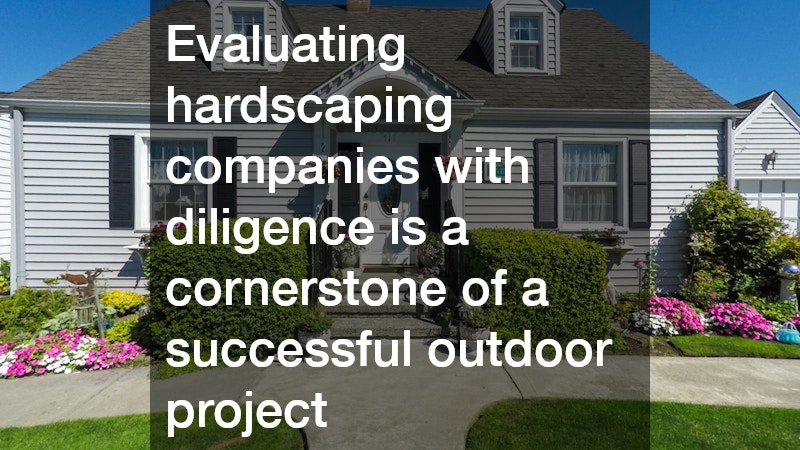Choosing the right hardscaping company is crucial for ensuring the success of your project. Hardscaping, which involves the use of hard landscape materials like stone, concrete, and wood to create functional outdoor spaces, requires a high level of expertise and precision. Making informed decisions when evaluating potential companies will not only save you time and money but also lead to outcomes that enhance the aesthetic appeal and value of your property.
What Criteria Should I Use to Evaluate Hardscaping Companies?
Check for Proper Licensing and Certifications
Proper licensing and certifications are indicators of a legitimate and professional hardscaping company. They ensure that the contractor has met the necessary legal requirements and industry standards to perform the work.
Look for certifications from recognized organizations like the Interlocking Concrete Pavement Institute (ICPI), as they signify adherence to best practices.
Licensing not only confirms the legality of the operation but also protects you legally should issues arise during the project. Certifications can also be viewed as a sign of commitment to professional development and staying updated with industry advancements. A company without proper credentials may offer cheaper rates, but at the risk of subpar work and potential legal complications.
Evaluate Experience and Portfolio
Experience is a testament to a company’s ability to handle a project successfully and adapt to challenges. By reviewing a company’s portfolio, you can gauge their creativity, quality, and scope of work. Look for a diverse portfolio that includes projects similar in scale and style to yours.
When examining portfolios, take note of the quality of workmanship and attention to detail. An experienced company will have a history of completed projects that demonstrate their expertise and ability to meet client expectations. Experience often correlates with a company’s ability to foresee potential issues and solve them efficiently.
Another advantage of experience is the likelihood of having established relationships with suppliers, potentially resulting in cost savings for you. A well-rounded portfolio also reflects the versatility and capability of the company to handle various materials and design challenges. Engage the contractor with questions about specific projects to understand their decision-making process and problem-solving abilities.
How Do I Ensure I Get a Competitive and Fair Price?
Request Multiple Quotes
To ensure you get a competitive and fair price, it’s important to request quotes from multiple hardscaping companies. This practice not only helps you compare pricing but also the scope of services offered. For an accurate comparison, ensure all companies provide a quote for the same specifications.
Multiple quotes will reveal pricing disparities that may require further investigation. Sometimes, a significantly lower estimate might lack specific services or suggest subpar materials. On the other hand, quotes that include detailed line items and descriptions can provide clarity on what’s included in the service package.
Understand What’s Included in the Quote
A thorough understanding of what’s included in a quote is crucial to avoid unexpected costs down the line. A detailed quote should break down material costs, labor fees, and any additional charges like cleanup or removal services. By scrutinizing these details, you can also assess the quality and type of materials proposed.
Hidden costs can emerge from vague contract terms or a lack of specifics on equipment and material use. Always ask for a written breakdown and verify the necessity and value of each item listed. This will help you identify elements that might inflate the budget unnecessarily and negotiate alternatives.
What Should I Expect from the Project Process and Timeline?
Understanding the Project Timeline
Understanding the project timeline involves setting realistic expectations for the duration and phases of your hardscaping project. The timeline will largely depend on the complexity and scale, with smaller projects taking a few weeks, while larger, more intricate designs could extend to several months. Discuss this thoroughly with your contractor to align on a feasible completion date.
Timelines should include all phases from initial groundwork, material sourcing, to final touches, allowing for delays due to weather or unforeseen challenges. A clear project timeline provides a roadmap and benchmarks to track progress effectively. Regular updates from the contractor help keep you informed and prepared for any alterations.
Ensuring Clear Communication
Effective communication channels between you and the contractor are crucial in managing expectations and project goals. Establishing a preferred method of communication early on—be it email, phone, or in-person meetings—can prevent misunderstandings. Regular briefings can ensure transparency on progress and prompt identification of issues.
Clear communication helps in addressing questions or changes promptly, minimizing disruptions. It is also essential in ensuring that any modifications to the original plan are documented and mutually accepted. Foster an open dialogue with your contractor to promote trust and a cooperative working relationship.
Evaluating hardscaping companies with diligence is a cornerstone of a successful outdoor project. From ensuring proper credentials to negotiating fair terms and understanding the project process, each step is pivotal for achieving your vision. Thorough evaluation safeguards your investment and maximizes the value added to your property, ensuring not only immediate satisfaction but also long-term enjoyment and utility of your hardscaped space.
.



